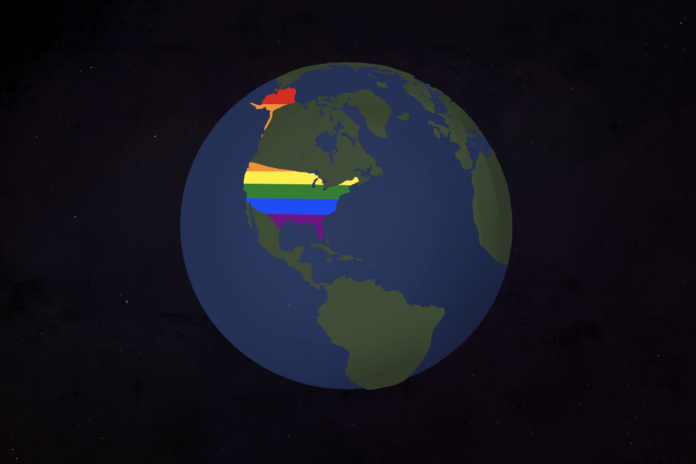
In 2007, Jasbir Puar, professor and graduate director of Women’s and Gender Studies at Rutgers University, coined the term “homonationalism” in her landmark queer theory text titled “Terrorist Assemblages: Homonationalism in Queer Times.” The book dealt with the manner in which ideas of sexuality, gender and ethnicity are changing reprehensibly to work in favor of nationalism, counterterrorism and national security.
Our country undeniably has an atmosphere of heteronormativity, as seen by the past and current discrimination that members of the LGBTQ+ community face and the associated normativity of heterosexuality. From their lack of media representation to their struggles to receive proper health care, I can barely scratch the surface of the shortcomings and injustices that permeate our society. However, contemporary advances in LGBTQ+ rights have shifted the landscape, causing newfound rights to become increasingly intertwined with more progressive values, also known as progressivism. Progressivism, after all, tends to be linked with newer left-wing politics and social change.
Due to that relationship, LGBTQ+ rights are sometimes used as a measure of national sovereignty, how moral a society is or declaring some places as better than others. This ideology, however, is flawed because using LGBTQ+ rights as a political pawn is disingenuous to that community. Furthermore, countries that critique other countries for their LGBTQ+ policies often have their own issues that they refuse to address.
Take South Africa, which, long story short, has a very repressive and close-minded history with regard to LGBTQ+ rights, especially in relation to HIV and AIDS. Despite that history, the country’s post-apartheid LGBTQ+ legal changes to support them emphasize South African exceptionalism, allowing the country to use the contrast between its repressive past and its more recent advances to compare itself other African countries.
In a 2016 United Nations meeting, for example, South Africa’s U.N. Ambassador Jerry Matjila emphasized his desire to fight discrimination everywhere, since many countries across the continent of Africa lack such a framework or even a desire to try to do so. South Africa has gone as far as using that exceptionalism as a tourist ploy, with Cape Town being promoted as a “great gay travel [destination].” All of this occurs while ignoring the systemic issues that still exist in South Africa, such as the disproportionate benefits of same-sex marriage to middle-class, white people as opposed to those in disadvantaged communities with greater levels of stigma and discrimination.
This circles back to the idea that LGBTQ+ rights are often used as means of nationalism in one’s country. Though it is true that South Africa has made advances with respect to LGBTQ+ rights, using those advances to take on a role model position is short-sighted, to say the least. LGBTQ+ people in South Africa continue to face major challenges day to day, such as continued ingrained cultural homophobia, so to make an example out of the current state of affairs is doing those people a disservice.
For an example more pertinent to our lives here in the United States — following 9/11, Middle Eastern people became an increasing target for racism and blame. Consequently, LGBTQ+ freedoms in the United States were used as a way to contrast our own country with those that have more homophobic laws. This distinction was used as one of the many ways to justify the global War on Terror.
At the end of the day, another country’s stance on LGBTQ+ rights should never be used to make Americans feel better about going to war with them. If we look down on other countries for their homophobic policies, we must first acknowledge that they have long, rich histories like colonialism, that have caused them to develop differently from our own country.
As of 2021, nearly two-thirds of the 69 countries in which being gay was illegal had one thing in common: They had all been under British rule at some point, thus exposing colonialism’s role in hindering social progress in various countries.
Take Barbados, for instance, which became a republic, formally cutting ties with the British monarchy, in 2021. As of 2018, the country retained life imprisonment as the penalty for various vaguely defined same-sex interactions and relationships. Not to mention, Barbados’s constitution contains a clause that prevents any pre-independence laws from undergoing judicial review. Therefore, since anti-LGBTQ+ laws were passed under the British Empire, they are unable to be challenged in court. This does not necessarily mean that pre-independence laws cannot be repealed by the legislature at some point, but more so means that the government cannot be sued or get into any legitimate legal trouble for those laws. In general, historical context is paramount to our understanding of LGBTQ+ policies across the globe — Barbados’s history of British colonialism is what enabled these outdated laws to be implemented in the first place. This is seen in contrast to the United States, which has been independent for centuries.
While keeping historical context in mind, we must also realize that even though the U.S. is comparatively progressive with respect to LGBTQ+ freedoms, western “acceptance” of LGBTQ+ people is conditional and limited. To this day, we have limited national policies regarding conversion therapy and the gay/trans panic defense — a legal defense used to legitimize violent crimes against the LGBTQ+ community based on panic caused by unwanted same-sex advances, or the issue of trans women being incarcerated in men’s prisons, and vice versa.
Tiffany Ball, an advisor at Tsinghua University and lecturer at the University of Michigan with a Ph.D. in English and Women’s Studies, highlighted that there is an issue surrounding “the lack of access to quality and life-affirming healthcare, especially for trans folks, human beings with uteruses and people of color” in the U.S. Under that healthcare umbrella is a greater risk of certain diseases for people in the LGBTQ+ community such as HIV/AIDS, HPV, cervical cancer and anal cancer, paired with lesser access to healthcare. Healthcare is a fundamental right to which everyone should have equal access; however, that is unfortunately not the reality. This further proves the way in which the United States is itself far from perfect with respect to LGBTQ+ rights and should not be using said policies for nationalistic purposes.
At the end of the day, there is no such thing as a “gold standard” or role model country when it comes to fundamental rights that have been withheld from people all across the globe — the extent of that withholding is not a means for comparison. To think we can implement some standard of modernity or progressiveness for use of comparison in situations of oppression is ignorant.
On the same premise, Ball posits that she would “hesitate to ‘rank’ countries in these terms since that language reproduces the assumption that social justice is an ahistorical phenomenon. Different people and researchers have different visions of what an equitable society looks like. When we assume that the Western vision of social justice is the ‘best’ one, we are complicit with cultural imperialism and U.S. hegemony.”
Though it may not be ill-intended, homonationalist sentiments ultimately pit queer people and people of color against one another. By making a flashy spectacle of our social progress, we are actually moving in the opposite direction, as we fail to acknowledge the places where we continue to fall short and use LGBTQ+ people as pawns in encouraging xenophobia. Ball emphasizes that “people in power (will) use whatever rhetoric is necessary to further their political desires. Allegations of homophobia and misogyny are, at times, deployed to create a palatable villain and a binary opposition between ‘us’ and ‘them.’”
Despite this “us” versus “them” mentality, we must remember that from country to country, we all live on this planet together. The struggles someone is experiencing halfway across the globe are more universal than politics may portray them to be. In acknowledging and fleshing out these struggles, we can lean on one another for support and human understanding, rather than comparing the incomparable. Let us discontinue the use of LGBTQ+ liberation politics for comparison, and in doing so we will find greater international solidarity and worldly acceptance.
Anna Trupiano is an Opinion Columnist & can be reached at annatrup@umich.edu.
Have thoughts about our articles? The Michigan Daily is committed to publishing a diversity of Op-Eds & Letters to the Editor. Submission instructions can be found here.
Please consider donating to The Michigan Daily









